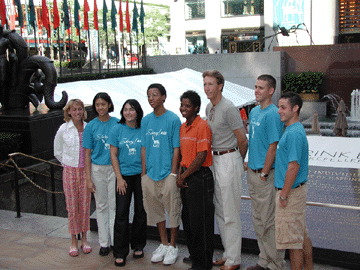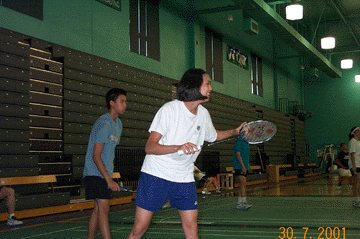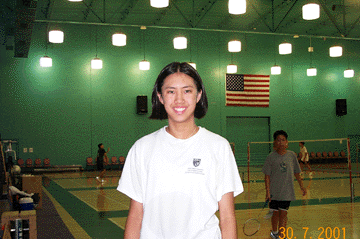The Air of Glory
September 15, 2001
Among those asthmatic student-athletes is Mesinee Mangkalakiri (May), an 18 year-old Thai-American badminton player. May is currently ranked by USBA (U.S. Badminton Association) 2nd in doubles, 7th in mixed doubles, and 5th in singles. She has earned her place on the 2001 U.S. National team, and is training for 2004 Olympics. She was diagnosed with asthma when she was 9 years old.
This past July, this cheery badminton player takes her first step in making badminton a more familiar name by being the first badminton applicant and recipient of the 17th Annual Schering/KEY “Will to Win” Asthma Athlete Scholarship. May has won the Silver Award Scholarship of $5,000.
May didn’t expect too much after she mailed in her application. She admits, “I was expecting to hear that I lost. Actually I forgot about it.” Her mother kept the announcement letter a secret until Don Chew’s birthday party. “P’Gus [Don’s son] announced it, like ‘By the way, one of our athletes won a scholarship.’ I knew he was talking about me, but I didn’t know which scholarship it was. When he said ‘Will to Win’ I thought, cool I got $1,000 [Bronze Award]. Then P’Gus said, ‘May, you and your family are going to New York and you’ll get at least $5,000!’ And my jaw just dropped.”

May (second from the left), fellow scholars, and world reknown atheletes in New York City.
May and four other students were the finalists for “Will to Win” top awards. This Schering/KEY program awards college scholarship to 10 high school seniors (12th graders) who have overcome asthma to achieve outstanding athletics and academic success. There are one $10,000 Gold Award, four $5,000 Silver Awards, and five $1,000 Bronze Awards. The finalists and their families traveled to New York City for the award announcement, press conference, formal banquet, and other fun activities in the Big Apple paid for by Schering/KEY.
“I had the best time of my life,” says May. Her face lights up as she reminisces the trip, “They treated us like celebrities! We traveled in a limousine everywhere, and the parents followed in a big tour bus. All these famous people came up to introduce themselves to us and chat with us.” The top winners went on national television, CBS and NBC, to talk about the scholarship with tennis legend Billy Jean King. On July 13th, the awards were announced at the press conference and breakfast at ESPN Zone in Time Square. Three of America’s most distinguished asthmatic athletes, Olympic soccer goalie Brianna Scurry, track legend Mary Slaney, and high jumping great Dwight Stone, were onsite to congratulate May and her fellow winners. The award ceremony weekend wrapped up with a black-tie banquet on a cruise around New York harbor.
It has been 2 months since the fanfare of “Will to Win”, but May is still amazed by that opportunity. “I don’t think it sinks in quite yet, but to be one of the top 10 kids they picked out of 4,000, that has to mean something,” May says. “And of course, $5,000 is a lot of money. That’s going to help me a lot in college.”
In September, May is going to start college at University of California at Irvine (UCI), 15 miles from OCBC. She hasn’t selected a major yet, but pondering international business. Preparing for her first semester in college, May has just passed the learner’s permit test, and will be taking driving lessons. “Can’t wait to drive myself to places,” May says with a giggle. “I want to do everything before school starts because it’s going to be crazy. I have the annual pass to Disneyland so I’ve been going once a week. Oh, and I’ve been sleeping a lot too since I don’t think I’d get to do a lot of that during school.”
May might have only 12 units but her days will be full. “I’ve picked only 3 classes, and all in the afternoon so that I can train in the morning, and come back to train in the evening. The coaches said that I can miss some training days, and I think I’d probably have to take up the offer. But I would work my butt off to make up for those days. And I’d do the same thing with college too. My goal is to do well in class and make it to the Olympics in 2004.”

Playing hard on the court with her younger brother Nicky.
May recalls the day when she discovered she had asthma. “My aunt was visiting from Thailand. I started to feel short of breath, but I thought it was because we were laughing so much. It got harder and harder to breathe, and then one night I could barely breathe at all. So my mom called 911, and the fire truck came. By that time, I started to breathe better. The paramedics checked on me and told my mom to take me to the emergency room.” For the next 3-4 days, she was put on the breathing treatment, and has been watching her conditions ever since.
There are several factors that trigger an asthma attack. It could be something the person’s allergic to, particles in the air, weather conditions, or in May’s case, exercise. May’s symptoms are called exercise-induced asthma. Physical activities like exercise, laughing, or crying could bring on the attacks. But nowadays, with proper treatment, children with exercise-induced asthma don’t need to limit their physical activities. They can do just about anything they want to do under proper management and medication. May’s parents, Siriporn and Anukoon, keep their watchful eyes on May as she continues with her athletic activities.
May finds that she has less asthma attacks when she is active than when she used to sit around. “I used to take medication everyday just because,” proclaims May, “now that exercise more, I barely take them. Some other people who have asthma kind of just sit there and watch TV. It just got worse.” Prior to starting badminton in 1996, May played tennis and basketball. A friend of the family, Don Chew—an experienced badminton player and the owner of Orange County Badminton Club in Orange, California, where May lives and trains—encouraged her to play badminton because of her athletic abilities and height advantage of 5’ 7”. Seeing the potential in this sport, May dropped the ball and picked up the birdies. And the rest is history.
Badminton is an intense and physically demanding sport. At the beginning, May thought she might not make it. “I kept getting asthma attacks during practice, and it frustrated the heck out of me. I had to stop and watch my friends from the side, and that upset me even more”, May vents. She then realized that being upset somehow caused her asthma attacks to worsen. “So I remind myself to take a deep breath, and not to get angry or upset. I smile a lot to keep myself in the good mood, and the attacks seem to go away. Now I rarely have them.” May concludes with a big smile on her face, of course.
You might wonder if May wants to play for Thailand instead. “I’ve been asked that a lot,” replies May. The fact that her parents are from Thailand doesn’t make her any less American. “Don’t get me wrong. I love Thailand. But when I dream about being in the Olympics, I only hear American anthem and see USA on my jersey.” May also confesses that, “I don’t think I would have the same chance at the Olympics if I was to play in Thailand. There are a lot more people playing badminton in Thailand than in the U.S., so it’s a lot more competitive. Only the best Thai players get training. But over here, badminton is a lesser-played sport, so the competition is not as tough. I have a shot at representing the country, and hopefully make badminton more of a household sport for Americans.”
While May was in New York, she had the chance to talk with Brianna Scurry and Mary Slaney about their Olympics experiences. “I asked them what it’s like to be the Olympians. They said that being in the Olympics is something not every person gets to do. Everyone wishes to go to the Olympics, but most people drop the dreams because they don’t have the drive or the opportunity. Being an Olympian makes you the role models for these kids. It gives you the chance to do things you never thought you could do. Like talk to kids about being asthma athlete, being drug-free. It’s not just about the sports that you play, but you’ve been where all of these people wanted to be. You can make a difference in their lives”.

You are looking at the rising star of American badminton!
Related Links